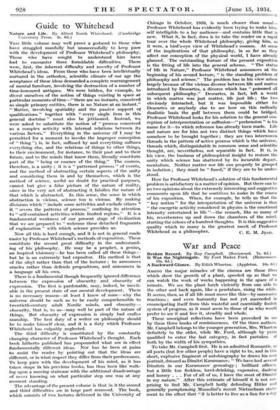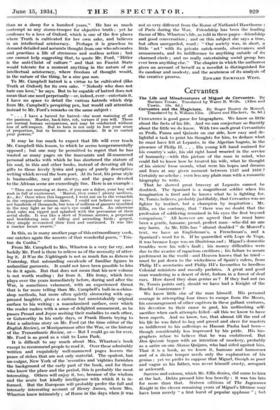War and Peace
Broken Record. By Roy. Campbell. (Boriawood. 7s. 6d.) A Backward Glance. By Edith. Wharton. (Appleton. 10s. 6(1.) AMONG the major miracles' of the cinema are those films which show the growth of a plant, 'speeded up so that we can watch the work of weeks happening in the space of a minute. We see the plant lurch violently from one side to the other and back again, like a pendulum, rising the while. It seems, then, as if life must move like this—by successive reactions ; and even humanity has not yet succeeded in emancipating itself from this wasteful and essentially foolish
system of progress, as it must seein'to those of us who would prefer to see it and live it, steadily and whole.
These unoriginal reflections have been provoked in me by theie three books of reminiscences. Of the three authors, Mr. Campbell belongs to the younger generation, Mrs. Wharton definitely to the older, while Mr. Ford, although by years qualified to enter the last category, in fact partakes of both by the width of his sympathies.
To take Mr. Campbell first. He is an admitted Romantic, as all poets (but few other people) have a right to be, and in this short, explosive fraginent of autobiography he draws his own portrait, dressed as Dimitri Karamazov: " We have had several Dimitris in our Karamazov genealogy ; brilliant officers, but a little too feckless, hard-drinking, expensive, dashing and horsey . . . For of all of us, I have the most of •Dimitri in my nature." After this estimate of himself it is not sur- prising to find Mr. _Campbell hotly defending Hitler and generally paraphrasing Mussolini's recent Nietzschean state- ment to the effect that "it is better to live as a lion for-a day
than as a sheep for a hundred years.". He has as much contempt as any storm-trooper for objective truth ; yet he confesses to a love of Oxford, which is one of the few places where Truth is cultivated for her own sake, and believes in an intellectual aristocracy. Perhaps it is graceless to demand detailed and accurate thought from one who advocates and practises a life of strenuous and restless action ; but one cannot help suggesting that, to quote Mr. Ford, "Hitler is the anti-Christ of culture " and that no Fascist State would tolerate for a moment anything in the nature of an intellectual 'aristocracy, where freedom of thought would, in the nature of the thing, be a sine qua non.
To Mr. Campbell hatred is a virtue to be cultivated (like Truth at Oxford) for its own sake. " Nobody who does not hate can love," he says. But to be capable of hatred does not mean that one need perpetually—or, indeed, ever—entertain it. I have no space to detail the various hatreds which drip from Mr. Campbell's perspiring pen, but would call attention instead to Mr. Ford's remarks on the same subject :
" . . . I have a hatred for hatred—the most maiming of all the passions: Murder, back-bite, rob, torture if you will. These are normal human occupations, and may be conducted without loss of self-respect. But to hate is not only to lose your sense of proportion, but to be-come a monomaniac. It is to curtail your powers."
It may be too much to expect that life will ever teach Mr. Campbell thiS lesson, to which he seems temperamentally opposed ; but one may be permitted to regret that he has wasted so many pages on the inaccurate and ill-mannered personal attacks with which he has shortened the stature of his soul, in this and other books, instead of devoting all his gifts to those lovely lyrics and pages of purely descriptive writing which reveal the born poet. At its best, his prose style is businesslike, racy and sinewy, and the pages devoted to the African scene are exceedingly fine. Here is an example : " Then one morning at dawn, if you are a fisher, your boy will rush in full of excitement. ' Master, they come I plenty sardines, &c., &c.' Once when this happened, I went out on to the verandah in the crepuscular crimson dawn. I could not believe my eyes : not hundreds of thousands, but tens of millions of gannets trembled in the rosy light as far as one's eye could reach. An otherwise dead calm sea ripped and splashed with the percussion' of their aerial shells. It was like a sleet of Norman arrows, a perpetual and bewildering rain of falling and ascending birds ; gorged, they simply re-vomited their food and continued. It was like a marine locust swarm."
In this, as in many another page of this extraordinary book, one catches again the accents of that wonderful poem, " Tris- tan da Cunha "
From Mr. Campbell to Mrs. Wharton is a very far cry, and luckily Mr. Ford is there to relieve us of the necessity of utter- ing it. It Was the Nightingale is not as much fun as Return• to Yesterday, that astounding cavalcade of familiar figures in unfamiliar garments. It could not have been possible to him to do it again. But that does not mean that his new volume is. not worth reading : far from it. His irony, which here plays over the years immediately before, during and after the War, is sometimes vehement, with an experienced thrust that is far more telling than Mr. Campbell's bull-in-a-china- shop methods, but more often quietly simmering with sup- pressed laughter, gives a curious but unmistakably original surface to his writing : a macadamized surface, over which the reader rushes with a sense of delighted amusement, as he passes Proust and Joyce reciting their maladies to each other, or Galsworthy in his early days, or Frank Harris trying to foist a salacious story on Mr. Ford (at the time editor of the English Review), or Montparnasse after the War, or the history of the Transatlantic Review, or— But I could go on for ever. Mr. Ford is as good as a visit to Luna Park.
It is difficult to say much about Mrs. Wharton's book except to recommend people to read it. Over these admirably written and exquisitely well-mannered pages hovers the peace of riches that are not only material. The opulent, but un-vulgar, New York of the 'seventies and 'eighties furnishes the background of the early part of the book, and for those who know the place and the period, this is probably the most interesting. Others will enjoy it, too, because of the wisdom and the acute but kindly intelligence with which it is in- formed. But the European will probably prefer the full and intensely interesting account of Henry James, whom Mrs. Wharton knew intimately ; of Rome in the days when it was not so very different from the Rome of Nathaniel Hawthorne ; of Paris during the War. Friendship has been the leading theme of Mrs. Wharton's life, as told in these pages—friendship and good conversation ; and on this subject she says a true, but often unregarded, word : " Our society was, in short, a little ` set' with its private catch-words, observances and amusements, and its indifference to anything outside of its charmed circle ; and no really entertaining social group has ever been anything else." The chapter in which the authoress gives an account of herself as a novelist is distinguished for its candour and modesty, and the acuteness of its analysis of the creative process.
EDWARD SACRVILLE WEST.

















































 Previous page
Previous page